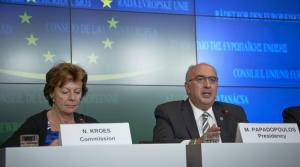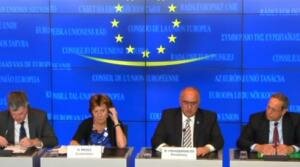- TTETransport, Telecommunications and Energy (TTE)
Networks and information security topped the agenda of the Council οf Telecommunications Ministers (Luxembourg, 6.06.2014)
Today, 6 June 2014, a meeting of the Council of EU Ministers for Telecommunications took place in Luxembourg, chaired by Greek Deputy Minister for Infrastructure, Transport and Networks, Michalis Papadopoulos.
During the Council of Ministers for Telecommunications, Member States expressed their views on how the proposed directive for network and information security can contribute to the organisation of cooperation between Member States in order to achieve the maximum level of cyber security for Europe as a whole. The basic element for improving EU readiness to respond to threats against networks and information security is the cooperation between various existing stakeholders. It was established that there is a general convergence of views as regards most provisions of this Directive, and that such convergence was evident in the progress report of the Council.
Furthermore, as regards the “Regulation on European single market for electronic communications” which is important to the EU, the outcome of the thorough examination so far is clear, as seen in the progress report of the Council. Therefore, future progress will depend on the capacity to identify certain policy sectors that, according to Member States, could provide some added value and contribute to EU progress and development.
The Presidency presented the Member States with two legal documents agreed upon by the Parliament and the Council, i.e. the Regulation on electronic identification and the Directive on broadband (BB) Cost Reduction. These constitute important progress for Europe in the Telecommunications sector, contributing in effect to the European digital vision, and benefiting all European citizens.
The Council was also updated by the Presidency on the proposal for a directive on public sector website accessibility. Specifically, the Presidency noted that it is now possible to have fast progress of this legislation, given the recent issuing of the related EU standard. This is a very sensitive issue and a priority of the Council.
Later, Commission Vice President Ms Neelie Kroes briefed the Council on the progress of the Digital Agenda for Europe, on the basis of most recent results. She made an outline of the current situation towards the completion of the Single Digital Market in 2015, and also of further efforts required for making full use of the Digital Agenda. Before lunch, the Council the formal part of the Council concluded with Italy announcing the priorities of its upcoming Presidency.
The working lunch was dedicated to Internet Governance, a hot issue following the recent NETmundial in Sao Paolo, Brazil, and evolutions in the USA.
Following the end of the Council, Greek Deputy Minister Papadopoulos stated: “Today, the Council had a very productive discussion on essential issues of telecommunications. Ministers expressed constructive views that will promote network security in Europe and the single telecom market in a short time. I wish Italy, which will succeed us in the EU Council Presidency, to have equally positive results as the Greek Presidency”.
Read more here.










